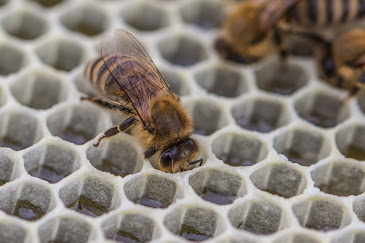Opportunity for PEI beekeepers: ATTTA is hosting a limited series of monthly informative discussion sessions with the PEI beekeeping industry. The second workshop of the series is set for November 24th, 2021. These sessions are offered through the PEI Beekeepers’ Association. See the infographic at the end of this week’s blog for all the details!
Honey Has Numerous Health Benefits for Bees*
This interesting article, delving into the health benefits of honey for honey bees, was published by the Smithsonian Magazine a few weeks ago and discusses a variety of benefits that honey offers to its little insect creators. It seems far-fetched that such a complex collection of organisms can be fueled and sustained by plain sugar water alone; there must be some other beneficial components in the main food source of bees that provide essential nutrients to sustain the proper healthy functioning of a honey bee colony. This article helped to highlight some of the key ways in which honey supports the health of honey bees. But, as the author highlights, this is no coincidence and is performed intentionally by bees as shown if you, “Offer a sick bee different varieties of honey, for example, and it will choose the one that best fights off its infection.” Bees have known about and have been taking advantage of the health benefits of various plant-derived chemicals (phytochemicals) through the collection of floral nectars and the making and consumption of honey and other hive products long before humans have! Honey is mostly sugar; however, it also contains other components including beneficial enzymes, vitamins, minerals, and various organic molecules. Thanks to these beneficial components, bees are able to collect and create their own functional food source that, compared to a diet of just plain sugar water, can:- Positively influence honey bee lifespan
- Increase the tolerance of honey bees to extreme cold and other harsh environmental conditions
- Improve the ability of honey bees to combat infections and promote wound healing
*McCoy, Berly, Knowable. “Honey Has Numerous Health Benefits for Bees”. October 25, 2021, Smithsonian Magazine. Full text available ONLINE.
Honey Bee Alchemy. A Contemporary Look at the Mysterious World of Bees, Hive Products and Health
If you are interested in learning more on the topic of hive products for both honey bee and human health, this book (originally written and published in Polish) has recently been translated to English and explores the following:“This is the first English edition of an important book on “Honey bee alchemy” by a Polish researcher. An entirely original, unparalleled work dedicated to the mysterious aspects of the life of bees, the magical properties of the products they produce, and the chemical composition associated with their medicinal properties. This book will be of great interest to beekeepers where they will find answers to many questions, such as: • Is royal jelly really a “panacea”? • Can “contamination” of royal jelly have a beneficial effect on its quality, and how can it be “contaminated”? • What is the “defensive power” of propolis? • Why microbes that can resist even antibiotics can’t cope with propolis? • What are the bees guided by when collecting herbal balms? • What new have we learned about honey recently? • Is honey a dietary product or a drug? • Are “herbal honeys” a gross fake or a new valuable beekeeping product? •.Why is beebread called “food of the gods”? • What is a drone brood: a troublesome waste of an apiary, or a valuable product? • What threatens bees and can they be treated without chemicals? The work of Professor lsidorov shows how little we still know about the secrets of bees, and how much needs to be done to learn them.”
Of course, there are many other insect pollinators that produce honey, however, honey bees set themselves apart thanks to their unique ability to producing enough honey to both support themselves AND provide beekeepers with the opportunity to harvest a share of their hard-earned food stores for human purposes.
More information about this book is available HERE.
Opportunity for PEI Beekeepers Association Members:
Connecting with ATTTA Specialists
If you’d like to connect with ATTTA specialists or learn more about our program, you can:
visit our website at https://www.perennia.ca/portfolio-items/honey-bees/
Email abyers@perennia.ca

